Why the brain matters: Public Engagement in The Gambia
By Briony Fleming, on 19 February 2019
This blog has been written by Laura Katus, PhD Student in Cognitive Neuroscience and Neuropsychiatry Section, based in UCL Great Ormond Street Institute of Child Health.
For me as a neuroscientist, there’s hardly anything more exciting than the human brain. When embarking on a PhD in a community where neuroscience thus far hadn’t been a thing, I thought it would be great to be able to share some of our enthusiasm with our participants, who after all come into the lab month after month to have us track their babies’ brain development. Our project, the Brain Imaging for Global Health project (BRIGHT project) is aimed at understanding infant brain development from birth to 24 months of age, both in the UK and in The Gambia, West Africa. The Gambia has an excellent infrastructure for research, and families commonly participate in ongoing research. However, some of our methods are quite different from say, the ongoing nutritional or epidemiological research. When on a visit to The Gambia, I suggested to the local team we try and organise an event for our participants, at which we would get the chance to dedicate a whole day of discussions and workshops about the brain and why we were so interested in researching it. Everyone was very positive about the idea and so, together with the local research assistant and another PhD student, we started planning our BRIGHT project Open Day.
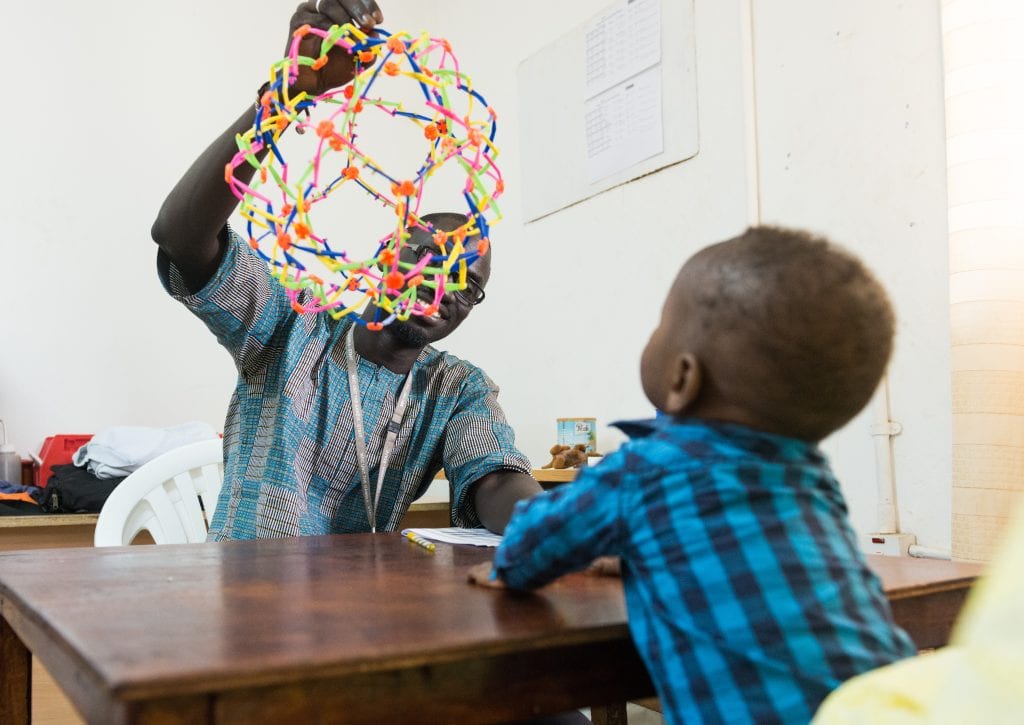
BRIGHT project participants during neuro-imaging and behavioural assessment. Keneba, the Gambia
My own journey into public engagement began some time before that, when volunteering at an event co-organised by the London Brain Project. Inspired by the fantastic workshop and resources the London Brain Project developed over the years, I thought that these were an ideal medium for our planned project in The Gambia. It was also at this event that I was made aware of the possibility to apply for funding through the UCL Public Engagement Unit. A few months later, I went on the training associated with the Train & Engage grant scheme, which allows UCL students to apply for up to £1000 to fund public engagement events. The training was extremely useful in that it changed my perspective on public engagement from ‘wanting to get the message out there’ to a much more interactive and two-way process which in turn could influence our research. After the training, we put together the Train & Engage grant application, for which we received excellent support from the Public Engagement Unit. We were also in the lucky position of having a very supportive project lead, who was able to provide funding for flights to The Gambia, as overseas travel would have blown our budget. In April 2018 the day had finally arrived and mothers, fathers and babies were brought to our Gambian field station. After a short welcome ceremony we split into groups and began to workshop.

Participants at BRIGHT project opening ceremony
Luckily, we were able to incorporate two London Brain Project inspired activities; the first illustrated how different areas of the brain work together in everyday tasks, by colour coding the brain and making a necklace out of differently coloured beads.

Participants in the ‘bead you brain ‘ workshop
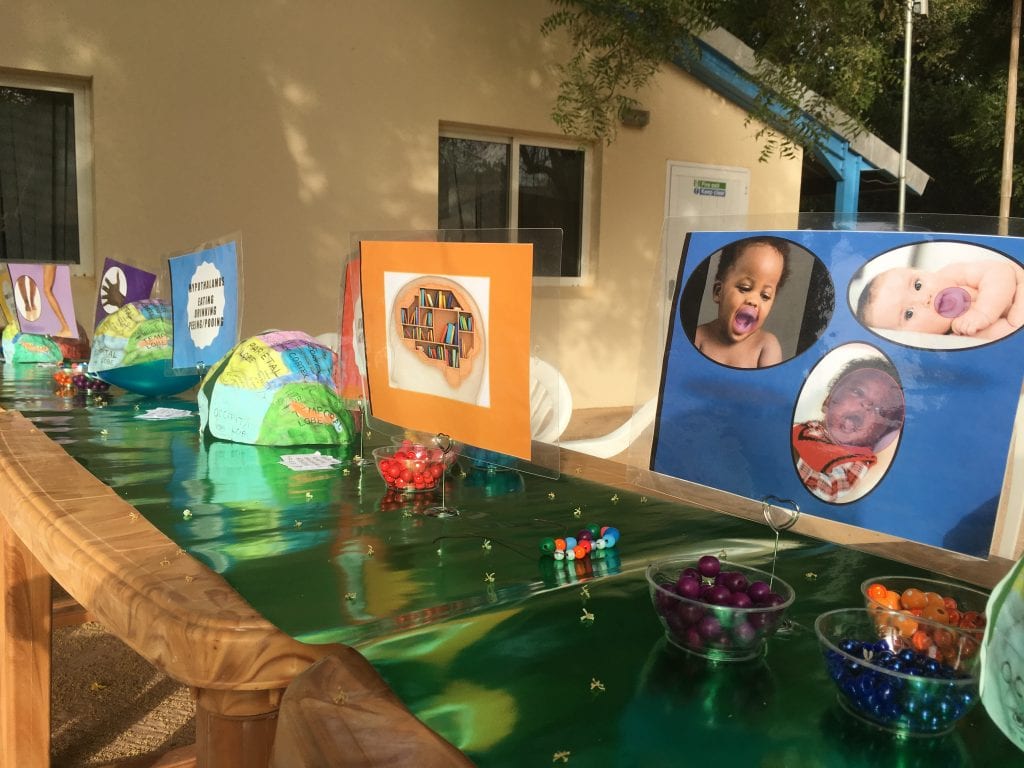
Participants taking part in a ‘bead your brain’ workshop
Another was an arts and crafts activity illustrating how babies’ visual system develops over the first year of life. Some people in The Gambia hold the belief that babies cannot see or hear at birth so this activity in particular sparked some interesting discussions between participants.

visual development workshop participant
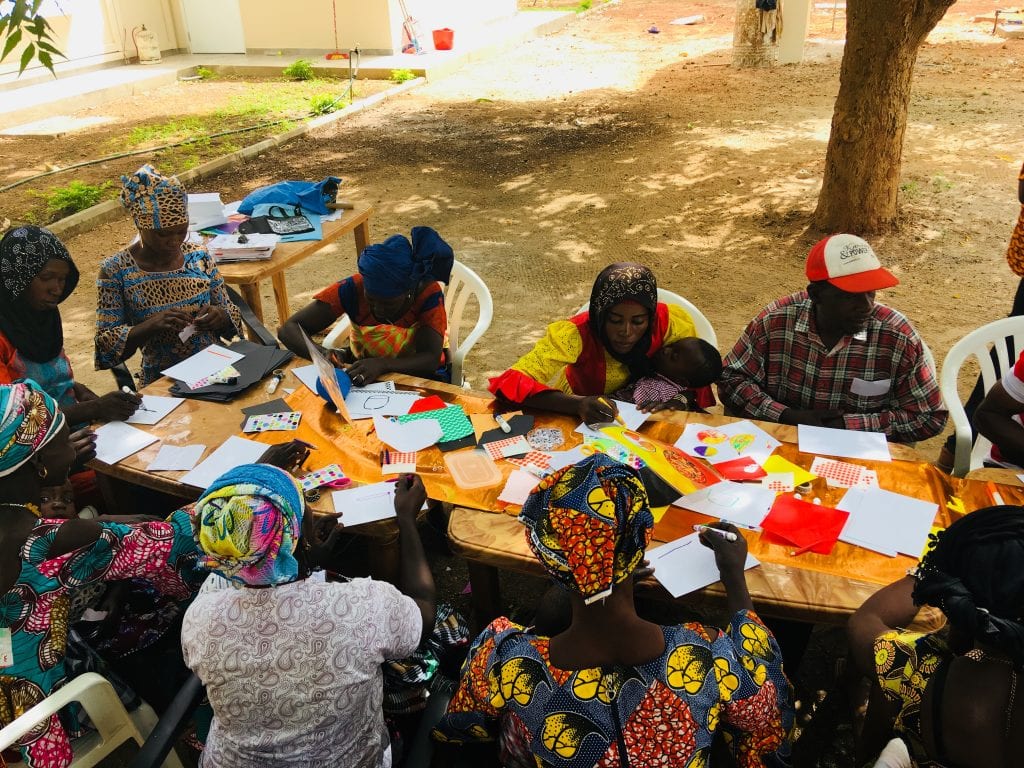
Participants taking part in a visual development workshop
At another station two team members explained some basic features of the brain during a little dissection of cow’s brain. They also played some games explaining how our neuroimaging equipment allows us to measure the brain. The last workshop focused on parental stress and mental health. Participants came up with experiences that can produce stress, especially for a new parent. Each of these stressors was represented by a block a volunteer had to carry illustrating the debilitating effect of stress on daily functioning. After that, participants were asked to think of ways to reduce stress, allowing the volunteer to reduce the burden of having to carry around the blocks.
After the workshop phase, the local drama group performed a play which discussed why in many studies biological samples are collected and that these are not used to make money, but are an important part of the ongoing research.
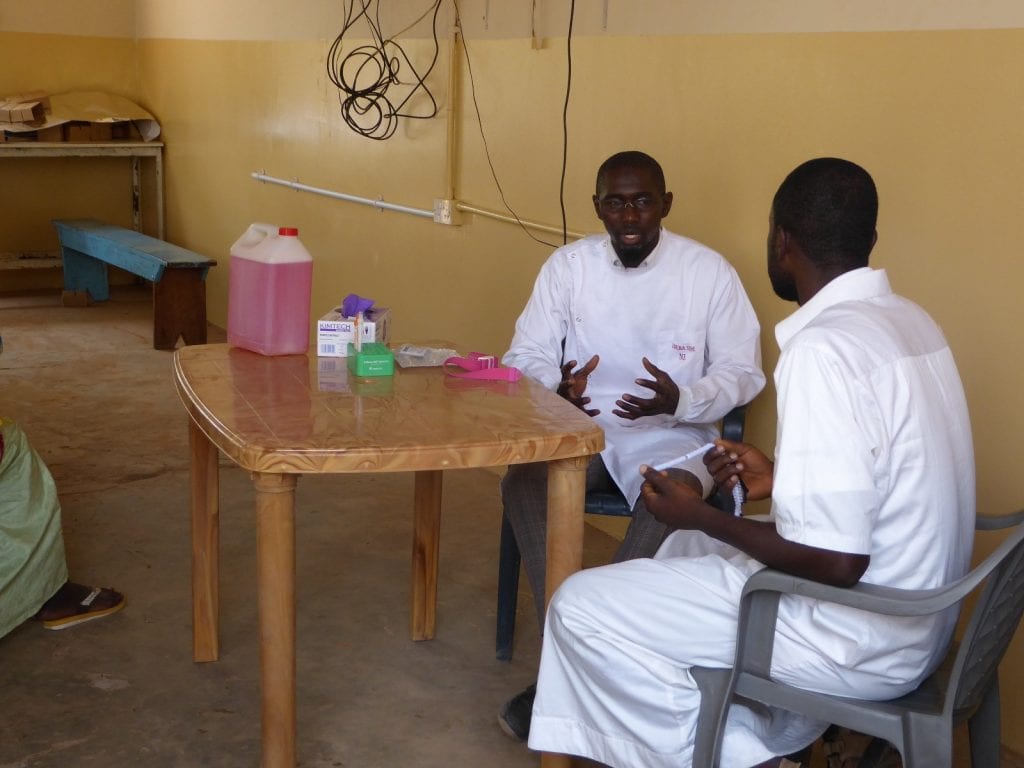
Two men take part in a play about the collection of biological samples
We were extremely pleased that the all the activities seemed to really resonate with attendees. From the feedback, it became apparent that they much enjoyed the event and learned many new things about the brain. Several attendees said that they had learned things they never knew before and that they would share what they learnt with others in their villages. Very positive feedback was given by several elders who hold and important status in their villages, we are confident that some of the topics will be discussed again in the wider community.
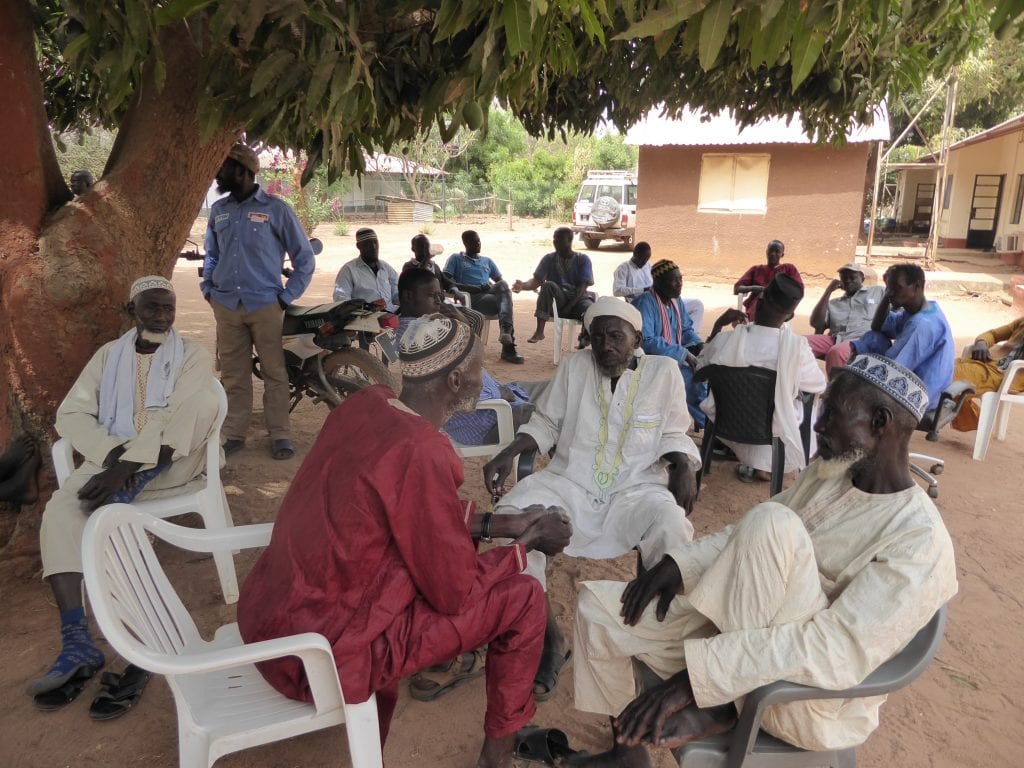
BRIGHT project participants discuss the proje
Especially the mental health workshop elicited interesting reactions, with several participants saying that they had never spoken about this topic before and found it really interesting and important.
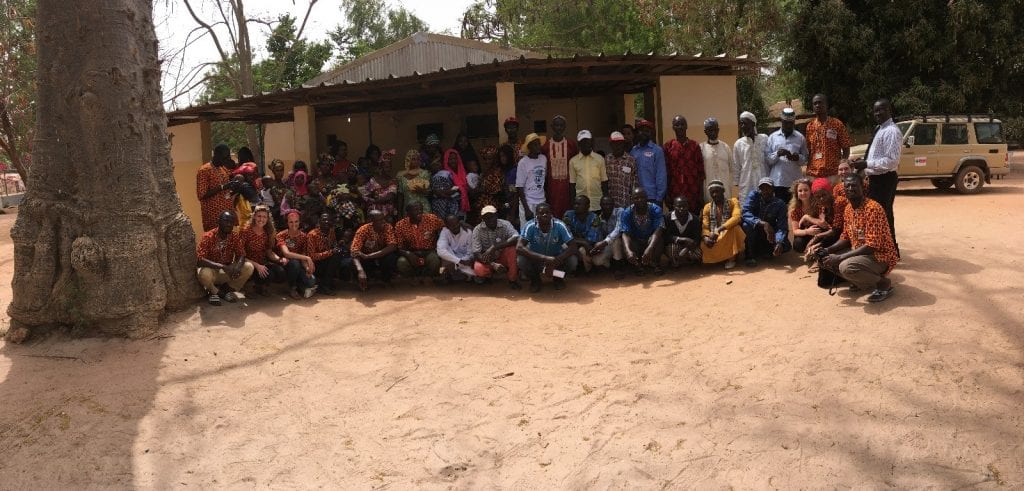
BRIGHT project participants group shot in The Gambia
In hindsight, it is hard to decide say though whether participants or staff enjoyed the event more. All workshops were led by our Gambian project staff who usually run the neuroimaging studies and neuropsychological assessments, and while experts on data collection are not trained neuroscientists. In the training we did not only cover how to run each workshop but also reviewed some evidence for how we can measure the brain’s structure and function. All staff said that they enjoyed the training and the event and we received feedback saying that this had made them realise how much they learned from running the study and that it made them proud to work on this project.
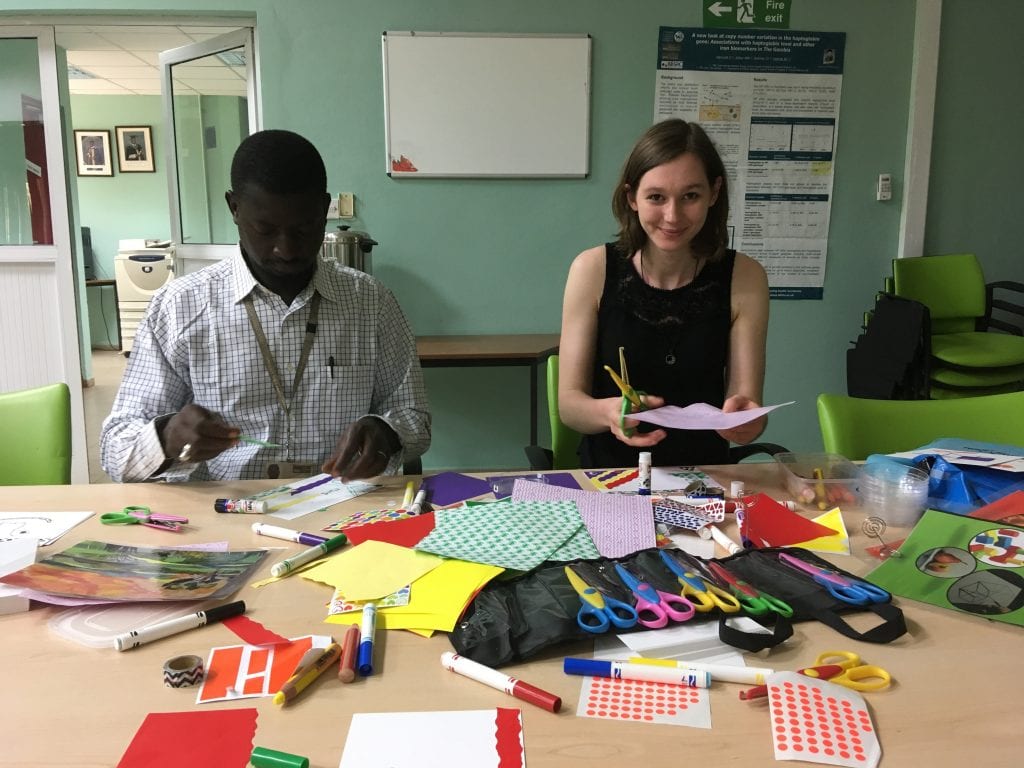
BRIGHT project team members prepare for the visual development workshop
Having had the opportunity to put together this project was definitely a highlight for the entire project team and for me as a PhD student. Obviously the team all had to dedicate time to the preparation, but for me personally this work provided just the right level of distraction to keep me sane during the final stages of my PhD research. With more and more of our data coming in, we are keen to hold a similar event towards the end of the study, possibly centred on the findings coming out of BRIGHT.

Group photograph of the BRIGHT project team, Keneba, The Gambia (2017)
2 Responses to “Why the brain matters: Public Engagement in The Gambia”
- 1
 Close
Close



Hi Laura
Firstly, the BRIGHT project open day you had looked brilliant!
I am part of a team working on research with PRECISE-DYAD: linking maternal and infant health trajectories in sub-Saharan Africa, at King’s College London. We are in the process of planning monthly ‘ PRECISE-DYAD open days’ in The Gambia and Kenya to connect with participants of the study and their families and communities – as you did in the BRIGHT project. Our aim is to engage participants in a variety of interactive learning sessions and discussions about pregnancy and mother and child health.
Is there any public/community engagement training you could recommend that would be targeted towards an African setting, that would also be accessible for our teams in Kenya and the Gambia?
Kind regards
Dani Toudup